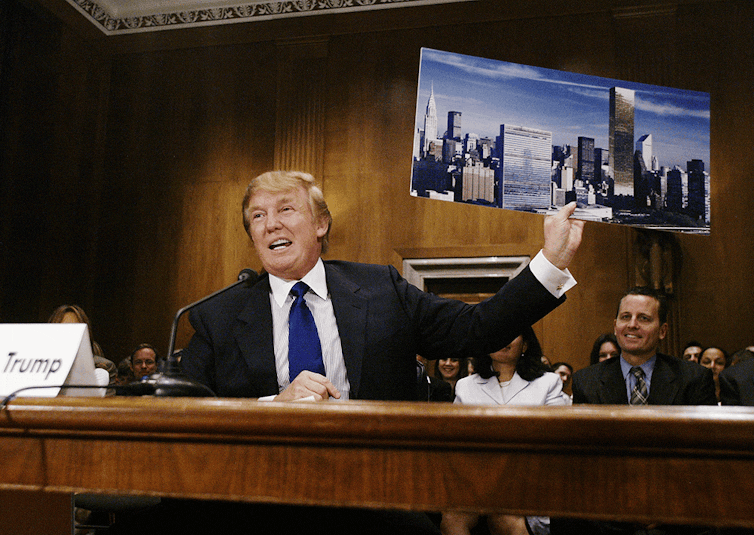Michael Cohen's testimony on Trump business reveals conduct that's widespread in corporate America
- Written by Bert Spector, Associate Professor of International Business and Strategy at the D'Amore-McKim School of Business, Northeastern University
The Trump Organization[1], Donald Trump’s private, family-run business, is well known to have operated at the fringes of what’s legal[2]. Trump got his start in the rough-and-tumble atmosphere of New York City real estate development[3], after all.
And so, as someone who pays close attention to how businesses operate[4], I was glued to the Feb. 27 testimony[5] of former Trump “fixer” and personal lawyer Michael Cohen[6], who also served as an executive vice president of the Trump Organization.
While I learned little that was new[7], the testimony was still troubling – but not for what it said about the Trump Organization.
Rather, what I found most noteworthy is how the conduct attributed to Trump the businessman, however extreme, actually reflects actions and attitudes that are widespread within corporate America generally.
Putting leaders on a pedestal
It is well known that Trump runs his enterprises – both business and governmental – on loyalty[8], rather than, say, competence or performance.
What Cohen highlighted was just how debilitating, even destructive, the lionization of individual leaders and expectation of loyalty can be, whether we’re talking about Trump, Facebook CEO Mark Zuckerberg[9] or Apple’s Steve Jobs[10].
Cohen said[11] he was “mesmerized” by Trump, calling him a “giant” and an “icon.” Being around Trump was “intoxicating,” he said, and “everyone’s job at the Trump organization was to protect Mr. Trump.”
Cohen’s testimony revealed just how blinding that commitment to a mesmerizing individual became, leading him to replace judgment with worship. Cohen admitted both to lying to Congress and to falsifying campaign finance reports in the name of standing by his boss.
Cohen’s description may seem startling. But to someone who has extensively studied leadership in business organizations[12], I recognize an unfortunate pattern that dominates corporate America.
Corporations all too often fall into the trap of romanticizing leaders, often to the detriment of performance[13]. By placing their own role front and center[14], CEOs enhance their self-esteem and justify their power and prodigious financial rewards.
And when employees attribute traits like heroism to their leaders, they tend to imbue them with the characteristics of charisma, strength and decisiveness. What gets submerged, unfortunately, is self-judgment and individual initiative[15].
It’s a comforting delusion. There is ample evidence[16] to suggest that the subsequent performance of all-powerful charismatic CEOs often lags behind that of rival companies led by less celebrated executives.
 Lionizing leaders like Facebook CEO Mark Zuckerberg can lead to bad results.
Reuters/Francois Lenoir[17]
Lionizing leaders like Facebook CEO Mark Zuckerberg can lead to bad results.
Reuters/Francois Lenoir[17]
Tax games
Another highlight of the hearing was Cohen’s testimony that Trump repeatedly deflated his assets[18] to reduce the real estate and other taxes he owed – while inflating them when it served his purposes. Cohen called Trump a “cheat.”
Even though Trump’s alleged behaviors may seem extreme, they are all too characteristic of corporate America’s startlingly widespread[19] penchant to reduce its tax burden – or avoid them altogether – by pushing at the boundaries of legality.
Many of the biggest American companies take advantage[20] of tax loopholes[21], like accelerated appreciation, overseas tax havens[22] and so forth, to accomplish the same goal that Trump allegedly sought: a lower tax bill.
More than half[23] of Fortune 500 companies with earnings of more than US$3.8 trillion paid zero taxes for at least one year between 2008 and 2015. More recently, Amazon paid nothing[24] on $9.4 billion in profits in 2018.
Of course, we won’t know precisely how successful Trump was in avoiding taxes until his tax returns are revealed.
 Trump was raised in the rough-and-tumble world of New York real estate.
Reuters/Molly Riley MR/TZ[25]
Trump was raised in the rough-and-tumble world of New York real estate.
Reuters/Molly Riley MR/TZ[25]
Checks and balances
But now we get to the big difference.
All corporations have their flaws. But when they are public, there are also checks and balances thanks to independent board members and vigilant shareholder advocates, as well as myriad governance and transparency rules imposed by the Security and Exchange Commission[26].
As head of a private business, Trump was able to avoid[27] virtually all of that accountability and transparency.
The Cohen hearing suggests Trump may finally learn what it feels like to be the CEO of a public company.
References
- ^ Trump Organization (www.trump.com)
- ^ fringes of what’s legal (www.bloomberg.com)
- ^ New York City real estate development (therealdeal.com)
- ^ businesses operate (www.americanbar.org)
- ^ Feb. 27 testimony (www.nytimes.com)
- ^ Michael Cohen (www.nytimes.com)
- ^ I learned little that was new (www.washingtonpost.com)
- ^ loyalty (www.politico.com)
- ^ Mark Zuckerberg (www.cnn.com)
- ^ Steve Jobs (www.psychologytoday.com)
- ^ Cohen said (www.nytimes.com)
- ^ studied leadership in business organizations (www.cambridge.org)
- ^ performance (press.princeton.edu)
- ^ placing their own role front and center (doi.org)
- ^ is self-judgment and individual initiative (www.forbes.com)
- ^ ample evidence (www.ncbi.nlm.nih.gov)
- ^ Reuters/Francois Lenoir (pictures.reuters.com)
- ^ Trump repeatedly deflated his assets (www.cnn.com)
- ^ startlingly widespread (itep.org)
- ^ take advantage (itep.org)
- ^ tax loopholes (www.nytimes.com)
- ^ overseas tax havens (www.pbs.org)
- ^ More than half (www.nytimes.com)
- ^ Amazon paid nothing (www.accountingtoday.com)
- ^ Reuters/Molly Riley MR/TZ (pictures.reuters.com)
- ^ Security and Exchange Commission (www.sec.gov)
- ^ was able to avoid (theconversation.com)
Authors: Bert Spector, Associate Professor of International Business and Strategy at the D'Amore-McKim School of Business, Northeastern University

